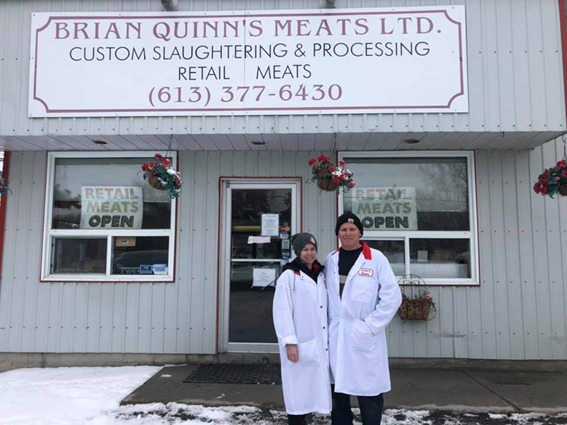Adam Prudhomme
Editor
Quinn’s Meats, a staple in the Yarker community for over 45 years, was lost to a devastating fire on June 27.
Employees on site were able to safely exit the building as fire crews from Stone Mills and Loyalist responded to the call. A large billow of smoke hung over the village and the road leading to the building was blocked off by the OPP while crews did their best to halt the blaze.
“We arrived on scene at just before 5 p.m. Heavy smoke was coming from the roof area,” said Stone Mills Fire acting chief James Richmond. “The Ontario Fire Marshal will be attending the scene to investigate.”
No cause has been determined as of yet.

Photo by Stone Mills Fire Department.

One fire firefighter was taken to the hospital but was deemed to be in stable condition.
“All employees were able to evacuate safely and no live animals were harmed,” added Richmond.
The building sustained heavy damage and is completely uninhabitable.
Quinn’s was established in Yarker in 1976 by Brian and Brenda Quinn, who sold the business to Darold and Kara Enright in early 2021. With nearly 50 years in the community, the meat processing plant was a huge part of the operation of many of the surrounding farms in Lennox and Addington County.

Kara and Darold Enright , seen here outside of Quinn’s Meats Ltd. shortly after acquiring the business in 2021. Submitted photo.
“We are devastated by the loss of our building at Quinn’s Meats to fire yesterday,” reads a social media post by Enright Cattle Company posted the day after the fire. “Deepest thanks to the Stone Mills and Loyalist firefighters who responded to the scene, and to our neighbours who brought them food and drink as they fought the fire. Our thoughts are now on how best to help our community of farmers and customers. We will provide further updates here and on our website as available.”
The loss of the building is a major blow to the local farming community as Quinn’s represented the only abattoir in the county. Even prior to the fire, the community was underserved to the point that in 2021 local farmers were exploring the idea of banding together to build an abattoir on Goodyear Road in Napanee to help meet the demand. The plan never got off the ground and the community now faces an even tougher road.
“The abattoirs live in a world in red tape, for good reason,” said Brian Crews, director of the Ontario Federation of Agriculture for Hastings, Lennox and Addington, Northumberland and Prince Edward. “We need to ensure the safety of our food supply. At the same time, we need to recognize that they are a business and they need to operate. Whatever help the government can do to make that regulatory process more streamlined to help these local abattoirs, not just the one that burnt down but all of them, we need it in the agricultural community. Not just the agricultural community but the community at large. These local food processing plants are really, really important.”
“I really hope that if (the Enright family) want to rebuild, whatever government regulators need to get involved and recognize the importance of expediting the process and make it as a seamless and stress free as for the family as possible,” added Crews.
The loss of Quinn’s-at least for the foreseeable future-creates a domino effect in the agricultural community. With more of a burden places on farmers, that means consumers can potentially see an increase on their grocery bill as well.
“I think the pandemic has shown us the importance of being self sufficient in the necessities of life,” said Crews. “Food and processing go hand in hand, one’s no good without the other one. We need agriculture but at the same time we need to get that food processed and to the consumer and whole network that has to work together to get that food from the farm to the consumer.”
Moe Street, advisory councillor for the Lennox and Addington Beef Farmers of Ontario, echoed those sentiments.
“We were short of kill plants or abattoirs in this area in the first place,” said Street. “With this gone it’s going to be devastating to a lot of our farmers who take their animals there.”
The closest options for farmers in L&A County are now in Hastings or Athens. Quinn’s also sold meat on site, allowing customers a direct supply for farm to table meat.
Street says the quickest option to help alleviate some of the backlog would be to revive the prison farm in Kingston, which was closed in 2010.
“There is an abattoir at the prison in Pittsburgh (adjacent Joyceville Institution),” said Street. “If we can get that going, that would be great. It’s up to the federal government, it’s their facility. We’ll have to get after them. We’ve been after them as a matter of fact for the last couple of years to get it open and we can’t seem to get ahead with them. I don’t know where to go from there.”
Though that would be the most immediate solution, Street says they’re committed helping to restore the facility in Yarker.
“Anyway we can help the Enrights, we’re going to help them,” said Street.

